Iranian Lawmaker Says Part Of Freed Funds Will Go To Central Bank
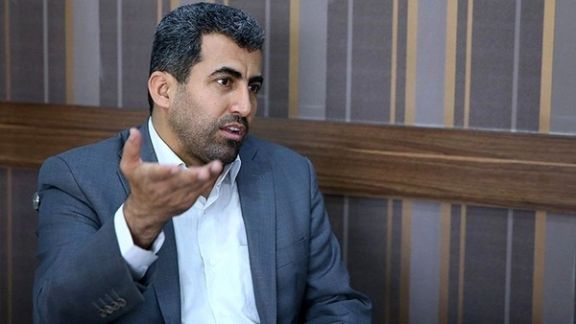
A senior Iranian lawmaker said Friday that part of Iran’s $6 billion released by the United States must go to the central bank to cover money already spent.

A senior Iranian lawmaker said Friday that part of Iran’s $6 billion released by the United States must go to the central bank to cover money already spent.
Mohammad-Reza Pourebrahimi, the chairman of the Iranian parliament's economic committee was quoted by local media as saying that part of Iran's freed assets needs to be directly deposited to the Central Bank of Iran, as the previous government of President Hassan Rouhani has spent the amount to cover government's expenditure.
The United States allowed South Korea in August to release the funds blocked due to US sanctions in exchange for five US citizens held hostage by Iran. However, the Biden administration has been insisting that the funds can only be used by Iran to import food, medicine, and other humanitarian needs.
"The Treasury Department has strict oversight over the use of those funds. We have visibility into how they are used, and we have the ability to police their use," State Department spokesperson Matthew Miller told reporters on September 12.
However, earlier this week, Iran’s President Ebrahim Raisi told NBC News that the money will be spent o whatever the Iranian people need. "This money will be budgeted for those needs and the needs of the Iranian people will be decided and determined by the Iranian government,” Raisi insisted.
There has been strong criticism of the Biden administration’s move in Congress. Many Republicans have accused the White House of caving into Iran and by offering a large ransom endangering the lives of other Americans.

As Iranians are bracing for rallies on the anniversary of Mahsa Amini, whose death birthed Iran’s biggest protest movement, regime forces have been deployed at strategic spots.
Security has gone beyond precautionary measures just one day before the first death anniversary of Iranian-Kurdish woman Mahsa Amini and the creation of the Women, Life, Freedom protests. Heavily armed military forces have been stationed in restive areas, particularly in Kurdish majority cities, and anti-riot police forces are mushrooming on streets of major cities.
Social media is exploding with hashtags related to the uprising and walls of cities are replete with graffiti against the Islamic Republic and leaflets of calls for demonstrations are being widely distributed while the regime is exhausting measures to prevent huge gatherings.
Armed forces have an extensive presence in Kurdish-majority cities like the hometown of Mahsa Amini Saqqez as well as Marivan, Bukan, and Sanandaj, where anti-riot vehicles are stationed at main squares and Revolutionary Guard helicopters are hovering over these cities.
A heavy presence of security forces is also reported in the country’s metropolitans such as Tehran and Tabriz, where large demonstrations are expected to take place. In the capital Tehran, forces have blocked roads to the graves of the protesters who have been killed during the last year's protests to prevent commemorative events from morphing into anti-regime protests.
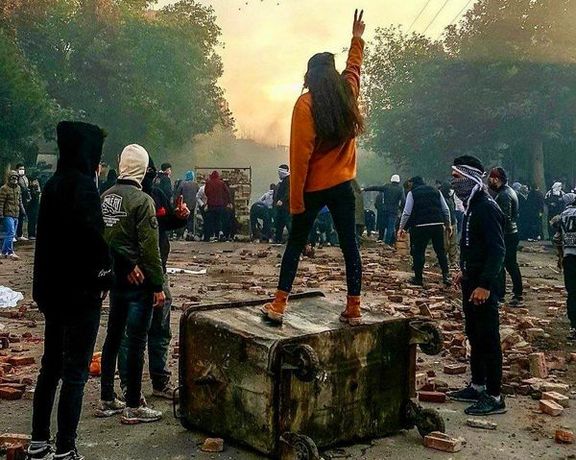
About 30 civil rights activists have been arrested only this week while several detained activists have announced hunger strikes in support of the expected protests.
During the past few days, state media has reported the dismantling of several groups accusing them of planning to carry out “acts of sabotage and terrorist operations” across the country. The IRGC said Thursday that 25 members of one of these “sabotage groups” were arrested in the northern Gilan province, while on Wednesday, the IRGC’s Intelligence Organization announced it had identified and dealt “a blow to some members of a riot organization network" across the country. In its statement, the IRGC claimed the network's members were being funded by the US State Department and led by the Freedom House, a Washington-based advocacy group, and the Nonviolent Initiative for Democracy, a Massachusetts-based NGO.
The IRGC commander in the western province of Ilam said a “sabotage group” was disbanded in the city of Abdanan, and the IRGC in the Alborz province said they rounded up protest leaders in Savojbolagh. In East Azarbaijan province, admins of a Telegram channel were arrested for encouraging protests.
Since the protests began on September 16 last year, about 600 protesters have been killed and tens of thousands arrested. According to the Oslo-based non-profit Iran Human Rights, Tehran executed approximately 697 people between September 2022 and September 2023, including seven for activities related to the protests. Iranian courts have sentenced another 10 protestors to death, and 82 are facing charges that include the death penalty. “The surge of executions in Iran shows that the regime is desperate, lashing out because its efforts to crush the nationwide uprising over the past year have clearly failed,” said Tzvi Kahn from the US-based Foundation for Defense of Democracies.
During the past several weeks, the regime has arrested, summoned or harassed the families of victims as well as the protesters who were temporarily detained, threatening them against participating in rallies or events this week. In addition to firing dozens of academics, warnings have been given to professors, students, and workers of several organizations to discourage any acts that can be seen as a sign of solidarity with the protests.
Human Rights Watch said on Friday that Iranian authorities have ramped up their repression on civil society for the one-year anniversary of the death in custody of Mahsa Jina Amini, calling on all delegations of UN member states meeting Iranian counterparts during the annual UN General Assembly this week in New York to raise the plight of activists and put it at the center of their engagement.
“Iranian authorities are trying to impose a chokehold on dissent to prevent public commemoration of Mahsa Jina Amini’s death in custody, which has become the symbol of the government’s systematic oppression of women, injustice and impunity,” said Tara Sepehri Far, senior Iran researcher at the rights group. “But Iranian authorities can't erase the mounting frustration, louder calls for fundamental change, and the resistance and solidarity in Iranian society in the face of mounting repression.”
On Thursday, the UN’s Independent International Fact-Finding Mission on the Islamic Republic of Iran said the state harassment of women and girls is on the rise, as authorities are exacerbating punitive measures against those exercising their fundamental rights, including freedom of religion, freedom of expression and peaceful assembly.
“Since Jina Mahsa’s death in custody, the Government of the Islamic Republic of Iran has failed to ensure truth, justice and reparations to her family, or to families of other victims, women, girls and all protesters who have been subjected to violations of fundamental human rights,” Sara Hossain, Chair of the Fact-Finding Mission, said. “Instead, the Islamic Republic is doubling down on repression and reprisals against its citizens and seeking to introduce new and more draconian laws that severely restrict further the rights of women and girls.”
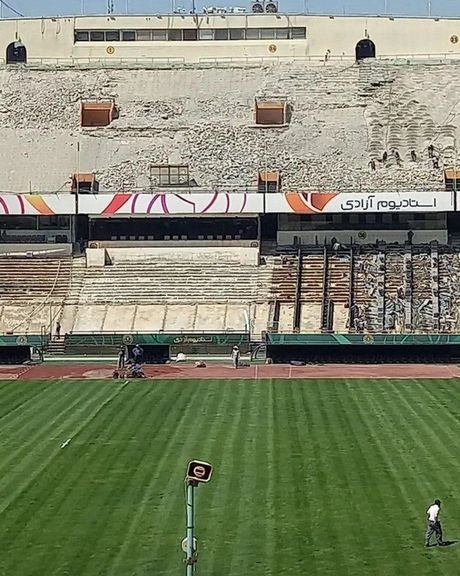
A former member of the Iranian parliament voiced apprehensions regarding the dilapidated state of Azadi Stadium ahead of the upcoming Asian Champions League.
Ali Motahari raised questions about whether the country's sports authorities were adequately prepared for the tournament which will bring iconic players including Cristiano Ronaldo. While the prospect of football superstars gracing Iranian soil has generated excitement, concerns have surfaced regarding the condition of the stadium's pitch and its facilities.
Motahari stressed the need to ensure that Azadi Stadium and the VAR system are fully operational to prevent last-minute complications that could potentially tarnish the country's reputation on the international stage.
A few days ago, the official Persian X account of the Saudi Arabian government announced that the Al-Nassr team would be hosted at Azadi Stadium. However, the choice of accompanying photos in the message triggered a significant debate as it spotlighted the deteriorated state of the stadium's stands, indirectly critiquing its overall condition.
The 78,000 capacity Azadi Stadium, home to the Iranian national football team, has grappled with maintenance challenges for over a decade. Originally inaugurated as Aryamehr Stadium by Mohammad Reza Shah Pahlavi on October 17, 1971, it was constructed to host the 1974 Asian Games and later served as the venue for the 1976 AFC Asian Cup. Since its inauguration in 1971, Iran has not seen the construction of a comparable stadium.
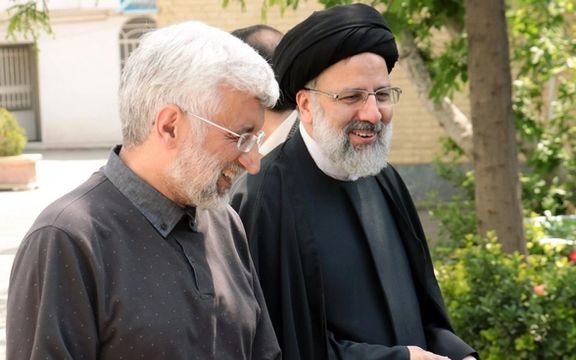
As the March parliamentary elections in Iran approach, many politicians protest political “purification” efforts by ultraconservatives aimed at monopolizing power.
Even some conservative figures previously branded as hardliners, including Expediency Council member Mohammad Javad Bahonar, expressed concern about the aggressive purging efforts by ultraconservatives, not only within the government but also in academic institutions.
Reformist cleric Hossein Ansari Rad, who served in the parliament in the 1980s, has bitterly said in an interview with Rouydad24 that the advocates of political purification prefer to have a bunch of non-experts around them rather than professional elites.
He also criticized the government for dismissing university professors and replacing them with unqualified individuals. In addition, Ansari Rad criticized the government's economic policies, stating that instead of functioning as a welfare state, it has created a nation of 80 million people reliant on government handouts to make ends meet.
He expressed regret that despite possessing valuable resources like oil and natural gas, Iran now grapples with severe poverty, pushing the country to the brink of collapse.
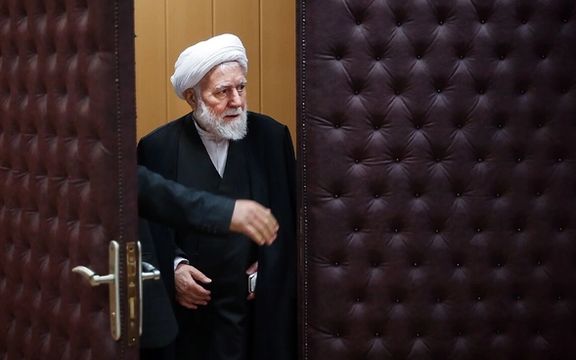
Nonetheless, Ansari Rad reiterated that advocates of political purification represent a minority within the government, attempting to monopolize political power in Iran for decades.
He recalled a time when Iran had wise leaders in positions of power and warned that the country is heading toward a deadlock. Currently, the nation's economic and foreign policy situations are so dire that countries like Oman and Qatar have to assist Iran and mediate with the U.S. to pursue Iran's interests.
Meanwhile, in an interview with Nameh News conservative commentator Mohammad Mohajeri said that former parliamentary speaker Ali Larijani was a victim of political purification during the 2021 presidential elections when the Guardian Council refused to endorse his qualifications as a candidate, although he is an experienced conservative who has served in many executive positions since the 1990s.
He added that both of Iran's leading political factions have promoted the idea of their own camp since 1979 whenever they gained dominance in the Iranian political landscape. However, the monopolization of power by ultraconservatives began under former President Mahmoud Ahmadinejad and has persisted since then. Mohajeri reiterated that, in fact, "Ahmadinejad was one of the architects of the concept of political purification."
He also emphasized the role of President Ebrahim Raisi's ultraconservative adviser, Saeed Jalili, as one of the masterminds behind political purification. He pointed out that Jalili is a powerful figure, actively involved in both the actual government and the shadow government. Mohajeri also named former Majles Speaker Gholam Ali Haddad Adel as a conservative figure who has played a pivotal role in purging critics and opponents from the establishment.
In another development, former Prosecutor of the Revolutionary Courts in Iran, Ayatollah Seyyed Hossein Mousavi Tabrizi told Rouydad24 that "Those who claim to be revolutionaries harm the trust between the people and government (regime) and make the country's situation volatile."
Tabrizi, currently serving as the secretary of the Seminarians Association in Qom, expressed his desire, saying, "I hope that radicals on both sides of Iran's political spectrum will leave the people alone as we approach the election time." He also recommended that the Guardian Council refrain from harshly disqualifying candidates, as this could harm the system and lead people to believe that certain groups intend to reserve all Majles seats for insiders.
"Ruthless disqualifications provide no incentive for voters to participate in the elections, and the Guardian Council should be held responsible for the resulting consequences," cautioned Mousavi Tabrizi. He added, "By abstaining from the previous round of elections, voters conveyed the message that no individual or organization should make decisions on behalf of the people."
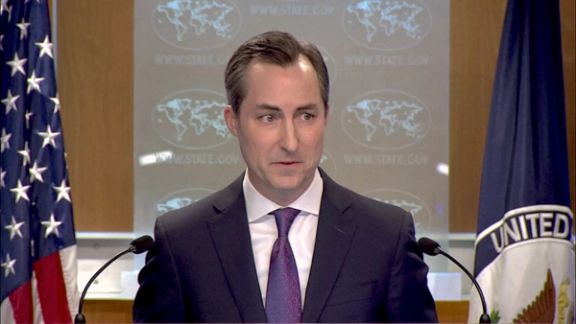
The US Department of State raised concerns about the Iranian regime's ongoing intimidation of the families of slain protesters and journalists.
Spokesman Matthew Miller noted on Thursday that this marks the fourth time in the last two weeks that Mahsa Amini's father has been summoned for questioning by the Iranian authorities.
He stated, "The world is watching its treatment of these families and the ongoing intimidation of journalists and abuse of peaceful protesters, and we will continue to watch it closely and take whatever steps are appropriate to respond to it."
The comments come in the wake of the recent release of approximately $6 billion in Iranian assets frozen abroad by the US government. This release is part of a larger deal that includes the exchange of five US prisoners held in Iran for five Iranians detained by the United States. However, the move has sparked controversy, with many Iranians condemning it as a “ransom payment”.
Notably, the hostage exchange deal left unresolved three other US cases – Jamshid Sharmahd, Afshin Vatani, and Shahab Dalili.
During a hearing before the Foreign Affairs Committee in Congress on Thursday, concerns were raised that the deal does not effectively deter further hostage-taking and allows the Iranian regime to divert resources meant for humanitarian purposes toward security forces, missile programs, and proxy groups. It also threatens to undermine the international sanctions regime.
However, Miller reiterated that the released funds would only be accessible to Iran for humanitarian purposes, such as acquiring food, medicine, and other necessities that directly benefit the Iranian people rather than the regime.
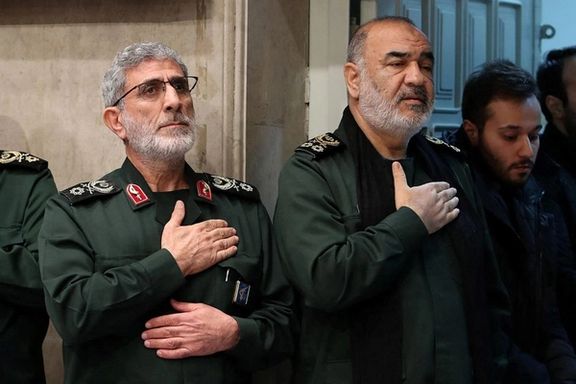
A rare criminal complaint was filed with Paris prosecutors on Thursday, targeting three senior Iranian officials from the regime's security apparatus.
The accusation against IRGC commander Hossein Salami, Intelligence Minister Esmail Khatib, and Quds force commander Esmail Qaani includes "death threats and justifying terrorism."
The six plaintiffs in the case are all exiled Iranians who have been living in France since the 1980s, and include a filmmaker, a journalist, a writer, and an LGBTQ+ rights activist. They have all taken public stances against Tehran, and their complaint, while largely symbolic, coincides with the first anniversary of Mahsa Amini's death last September, which sparked the Woman Life Freedom movement in Iran.
The threats were made in response to support for nationwide protests in Iran following the death of Mahsa Amini in custody of the morality police. One such threat came from Khatib on December 13, where he warned that "anyone playing a role in the riots will be punished, wherever they are in the world."
Additionally, on January 10, Salami himself made a statement regarding "the French people and the managers of [satirical anti-clerical magazine] Charlie Hebdo," suggesting they shouldn't concern themselves with Salman Rushdie's fate. This statement related to the fatwa against Rushdie issued by Iran's late leader Ayatollah Ruhollah Khomeini. The Charlie Hebdo staff had previously been targeted by jihadist gunmen in 2015 for publishing cartoons of the Prophet Mohammed.
Chirinne Ardakani, a French-Iranian lawyer from the Iran Justice Collective, characterized these threats as "disguised fatwas" against Iranian opposition activists worldwide.






